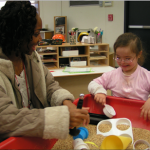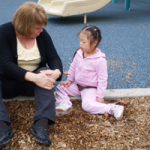Inclusion Checklists and Self-Assessments
Inclusion Checklists and Self-Assessments
Inclusion Checklists and self-Assessments are helpful in both guiding development and evaluating inclusive policies, programs and practices. They can serve to as a conversation starter to foster partnerships with program staff and families as well as to guide improvement efforts.
Play, Play, Play!
As of August 2018 the American Academy of Pediatrics is encouraging pediatricians to prescribe play to manage toxic stress and to promote the social-emotional, cognitive, language, and self-regulation skills that build executive function and a prosocial brain.
Five Sets of Tools and Resources to Support Learning for All Children
Explore new resources for identifying developmental milestones, visual supports, play, teaching language and literacy and preventing suspension and expulsion
Preventing Suspension and Expulsion
Do you have questions or concerns about a child in your care? The CA CSEFEL Leadership Team (California Collaborative on the Social and Emotional Foundations for Early Learning) has gathered tools and resources to support you! Your role in supporting the child behind the behavior is vital to the long-term outcomes and well-being of that child. MAP’s Summer News Brief introduces the new website and the nine sets of actionable resources that it holds.
Resources for Trauma Informed Care
The wild fires in California, the mass shootings in Las Vegas, hurricanes and their aftermath, violence and racism, and families experiencing homelessness or being threatened by deportation are all tragedies we have been exposed to. Our children, including children with disabilities, are watching the news, watching adults reacting to what they see and hear, or they may be directly affected by a crisis. We all need to be aware of the impact that these events may be having on children and on us as parents, caregivers, and educators, whether we are directly involved in a traumatic event or experiencing secondary trauma from just hearing about the trauma of others.
Working with Homeless Families
California Department of Education Resources and a Self-Assessment.
Supporting Immigrant Children and Their Families
Approximately 1 in 4 U.S. Latino children have a parent who is an unauthorized immigrant. This means that there are more than 4 million Latino children in the United States who are at risk of experiencing parental separation and the stress and fear associated with their family’s uncertain legal status.
Federal Policy Statements
US Department of Education Policy Statements and Guidance for Early Childhood
Winter 2016 – Building A Culture of Inclusion: 10 Guiding Questions
 Building a Culture of Inclusion: 10 Guiding Questions introduces the 2015 federal Policy Statement on Inclusion of Children with Disabilities in Early Childhood Programs and identifies California’s inclusion resources as well as key federal resources and other new resources that support recommendations from the Policy Statement. The resources are framed as the title suggests: Building a Culture of Inclusion: 10 Guiding Questions. This is a must read resource for anyone who is creating or sustaining inclusive settings.
Building a Culture of Inclusion: 10 Guiding Questions introduces the 2015 federal Policy Statement on Inclusion of Children with Disabilities in Early Childhood Programs and identifies California’s inclusion resources as well as key federal resources and other new resources that support recommendations from the Policy Statement. The resources are framed as the title suggests: Building a Culture of Inclusion: 10 Guiding Questions. This is a must read resource for anyone who is creating or sustaining inclusive settings.
Winter 2012 – Coping with Trauma
 The resources in the Coping with Trauma section of MAP will help you address the needs of children in times of violence and trauma. Some of the resources are specific to children with special needs and others are more general.
The resources in the Coping with Trauma section of MAP will help you address the needs of children in times of violence and trauma. Some of the resources are specific to children with special needs and others are more general.